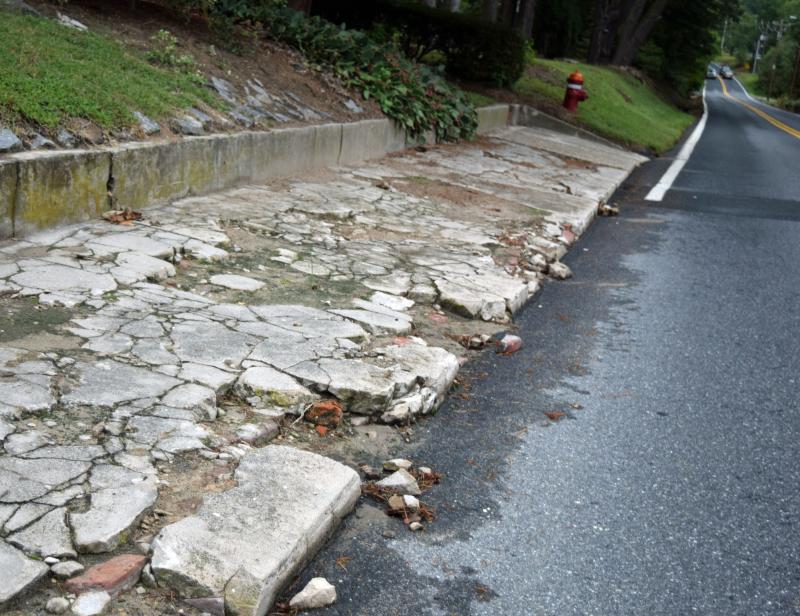To repair or not to repair: Milton wants sidewalks fixed
Anyone living in one of Delaware's small, historic towns knows trying to keep up with local rules and regulations can be a challenge.
But when it comes to sidewalk repairs, Milton officials say the law is straight-forward: It's the property owners' problem. It's homeowners' responsibility to maintain sidewalks, and they have to obtain necessary town permits to do the work.
Lifelong Miltonian Ron Lank, who lives on Atlantic Street close to where the sidewalk comes to an end, argues that he shouldn't have to fix something someone else has broken.
“We need some kind of barrier because they're coming up this hill so fast, [my neighbor] has to clean up chunks of concrete every week because people run over the sidewalks,” he said. “If I had damaged it, it would have been fixed.”
Lank said he can do the sidewalk repair himself, but his neighbor, Marshall Reynolds got a quote from a local paving company stating it would cost more than $16,000 to redo two sections of sidewalk in front of his home.
“It'll increase my property value by replacing it, but why do I need to go to the extreme for walkers when it's a dead-end?” Reynolds asked, referring to extra costs associated with complying with the American with Disabilities Act for accessible sidewalks. “This damage has been going on for years, and it's still going on. If I repair this tomorrow, tomorrow night somebody will run over it.”
Lank, 65, and Reynolds, 84, are two of more than 100 property owners who received a letter from town officials in May, requesting immediate repair of sidewalks next to their properties. Milton, like many other Cape Region towns, including Rehoboth Beach, Lewes, Georgetown and Milford, have ordinances that place the responsibility for maintaining and fixing sidewalks on adjacent property owners, not the town.
The financial responsibility falls on residents, as well, since grant funding through the Community Transportation Fund is only available to municipalities. Neighborhoods or entire streets could apply for county-administered funding through the Community Development Block Grant program, but securing funding is not guaranteed. Town officials recommend people take out loans if they don't have funds immediately available.
Because Lank and Reynolds live on a state-owned street, they would also have to cover the hourly cost for traffic flaggers, at about $50 per hour.
Milton Town Clerk Kristy Rogers said that while more than 200 violations were noted by the town's public works director and code enforcement officer, only 111 were serious enough to warrant letters seeking immediate action.
“We understand that it is a burden on a homeowner to have the expense of maintenance of a sidewalk,” Rogers said. She said letters were sent to anyone owning property next to a sidewalk that could cause someone to trip or fall.
“Our focus is public safety,” she said. “It's important for the citizens to understand the town will work with them as long as we have the assurance they realize the public safety issue and are working toward resolving the potential issue with their sidewalks. As long as we have that communication, we won't issue fines.”
The letter sent in May stated residents could be fined at least $25 a day as long as their sidewalk remains in disrepair. No fines have been issued, Rogers said, but another letter to unresponsive residents is on its way.
“We've checked the ordinances. We know we have legs to stand on,” said Milton Mayor Ted Kanakos. “And for the first time in 40 years, people are fixing sidewalks.”
Atlantic, Chestnut, Federal and Union streets are the major problem areas, town officials said. While this is the first mailing for sidewalk repairs Rogers can recall in her five years as town clerk, Milton's town code regarding sidewalk repair predates most of the town's current administration.
“It's been around here for a long time. It's just that it's never been enforced,” said Public Works Director Greg Wingo. “We're in that era where we have to start enforcing what's on the books.”
Wingo said with a small staff, it took about a year and a half to evaluate the sidewalks throughout the town. And while some residents may be upset by the letters, those who have complied – including several homes on Chestnut and Short Funeral Home on Federal Street – won't have to worry about potential liability from someone tripping on a broken sidewalk.
At least 51 property owners had completed repairs, and another 15 were underway by the end of September, Wingo said, but Lank wasn't one of them. And he won't be joining their ranks any time soon, he said.
“Right across the street there's no sidewalk, and over here we have to spend $15,000, $18,000, $20,000 for sidewalks,” Lank said. “I think this is all a money-making scheme to get income from permits and contractors. I think they want to buy some more houses or something.”
Editor’s note: In an earlier version of this story, DelDOT spokesman James Westhoff stated DelDOT is responsible for curbs. DelDOT is only responsible for curb face to curb face, not the actual curb, on state-owned roads.


















































